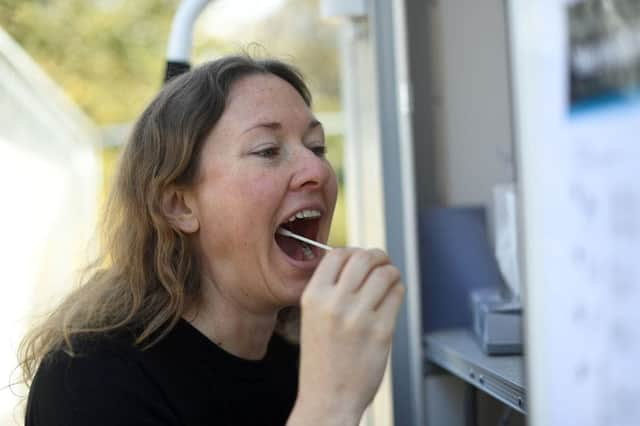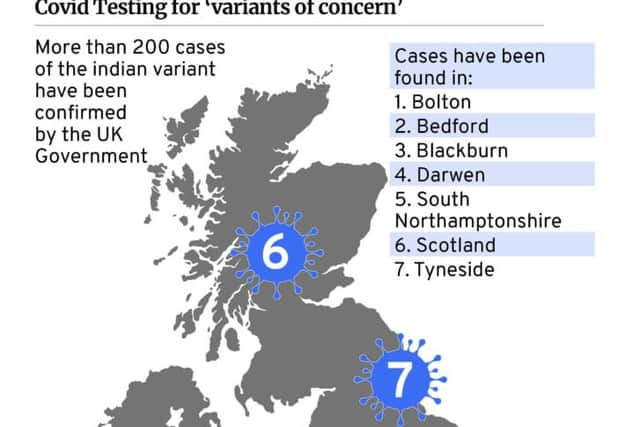Where India variant is dominant in UK - amid concerns lockdown could be extended


Covid cases in most areas of the UK are at their lowest levels since August last year, but there are concerns the Indian coronavirus variant could push infections back up.
Some 370 out of 380 local areas, or 97 per cent, are currently recording rates below 50 cases per 100,000 people, with almost one in four having rates that have dropped into single figures.
Advertisement
Hide AdAdvertisement
Hide AdHowever, a small number of areas are seeing a rise in cases as the India variant spreads across the UK.
The government's Scientific Advisory Group for Emergencies (SAGE) is reportedly due to hold an emergency meeting on Thursday (13 May) to discuss the variant and Boris Johnson's roadmap out of lockdown.
The Prime Minister has said there is "increasing concern" about the variant and warned the emergence of further new variants "pose a potentially lethal danger".
Where is the India variant dominant?
Surge testing has been under way in parts of Bolton since 7 May, after Public Health England (PHE) confirmed the town is one of the main locations of the India variant, which was reclassified as a ‘variant of concern’ last week.
The Scientific Advisory Group for Emergencies (Sage) met on Thursday (13 May) to discuss the variant after cases in the UK almost tripled in a week, rising from from 520 to more than 1,300.
Public Health England has recorded 1,313 UK cases of the Indian variant in total, with almost half of these cases related to travel or contact with a traveller.
The majority of cases of the India Covid strain are concentrated in the north-west of England, predominantly in Bolton, and in London.
The variant is also thought to be the reason behind half of coronavirus infections in Bedford, Blackburn with Darwen and South Northamptonshire, although these outbreaks are still small.
Advertisement
Hide AdAdvertisement
Hide AdGreater Manchester Mayor Andy Burnham has submitted a request to the Joint Committee on Vaccination and Immunisation that all over-16s in Bolton, along with the rest of the Greater Manchester area, are able to receive a Covid-19 vaccination “to mitigate the risks of spread in those communities where we are seeing more transmission”.
Outbreaks of the Indian variant have been identified in two areas of Tyneside, with customers of Allard's Lounge in Tynemouth now being asked to get tested after a case was linked to the bar. Anyone who visited the venue on Front Street between 23 April and 3 May is asked to "immediately" book a PCR test. The variant has also been identified in Newcastle, although the number of cases and locations have not been disclosed.
There are also around 20 to 30 cases of the India variant in parts of Scotland, including Glasgow, with these cases again connected to travel.
Surge testing is now under way in areas of the North West of England, where cases of the Indian variant of are increasing.
The UK government is also considering implementing ‘surge vaccinations’ in some of the worst affected areas, to allow people to get their Covid vaccination earlier to prevent further spread.


What is the India variant?
The India Covid variant, officially known as B.1.617, was first detected in India in October.
It has been designated a “variant of concern” by PHE as it is thought to be at least as transmissible as the variant detected in Kent last year, known as B117, which is now dominant in the UK.
PHE said there is currently no evidence to suggest that the new Indian variant is more serious than previous mutations, nor is there evidence which indicates that this version of the Indian variant is resistant to current vaccines.
Advertisement
Hide AdAdvertisement
Hide AdHealth experts said they “haven’t seen any hint” of a current Covid variant that can fully evade the effectiveness of vaccines.
On Wednesday (12 May), the European Medicines Agency said it was “pretty confident” that vaccines currently in use will be effective against the Indian variant, a view that has been echoed by some British scientists.
However, Professor James Naismith from the University of Oxford said not enough is known to say for sure whether the variant could frustrate the UK’s vaccination programme.
Speaking on BBC Radio 4’s Today programme, he said: “The vaccines don’t 100 per cent prevent infection for people.
“What they do is, they almost 100 per cent prevent hospitalisation and serious illness.
“We don’t know enough to know yet whether the Indian strain will behave differently than that.
“So even the regular virus can infect people who have been vaccinated and sometimes you do get reinfection.”
Could the variant delay lockdown ending?
The growing number of India Covid variant cases in the UK has sparked concerns that the lifting of lockdown restrictions, which is set for 21 June in England, could now be delayed.
Advertisement
Hide AdAdvertisement
Hide AdMinisters have also not ruled out re-introducing local lockdowns in areas where the variant of concern is increasing.
Foreign Office minister James Cleverly said that the government will make decisions based on the data, and measures will be eased “at a pace and in a way which is safe”.
Symptoms to look for
The main symptoms of coronavirus to look for include:
- a high temperature – this means you feel hot to touch on your chest or back (you do not need to measure your temperature)
- a new, continuous cough – this means coughing a lot for more than an hour, or three or more coughing episodes in 24 hours (if you usually have a cough, it may be worse than usual)
- a loss or change to your sense of smell or taste – this means you've noticed you cannot smell or taste anything, or things smell or taste different to normal
Most people with symptoms have at least one of these symptoms, although some do not experience any. As such, it is advised that everyone gets tested regularly to help prevent further spread of the virus.